
The Congregation for the Evangelization of Peoples was a congregation of the Roman Curia of the Catholic Church in Rome, responsible for missionary work and related activities. It is also known by its former title, the Sacred Congregation for the Propagation of the Faith, or simply the Propaganda Fide. On 5 June 2022, it was merged with the Pontifical Council for Promoting the New Evangelization into the Dicastery for Evangelization.

Angelo Scola is an Italian Cardinal of the Catholic Church, philosopher and theologian. He was Archbishop of Milan from 2011 to 2017. He served as Patriarch of Venice from 2002 to 2011. He has been a cardinal since 2003 and a bishop since 1991.
Manouba is a city in north-eastern Tunisia, and is part the metropolitan area of Tunis, also called "Grand Tunis". It is located at the west of Tunis city center at around 36°48′28″N10°6′4″E. It is the capital city of Manouba Governorate.
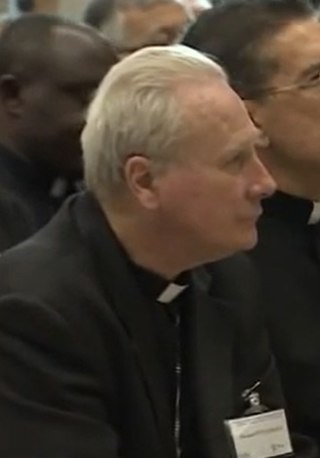
Michael Louis Fitzgerald is a British cardinal of the Roman Catholic Church and an expert on Christian–Muslim relations. He has had the rank of archbishop since 2002. At his retirement in 2012, he was the apostolic nuncio to Egypt and delegate to the Arab League. He headed the Pontifical Council for Interreligious Dialogue from 2002 to 2006. Pope Francis raised him to the rank of cardinal on 5 October 2019.

The Pontifical Oriental Institute, also known as the Orientale, is a Catholic institution of higher education located in Rome and focusing on Eastern Christianity.
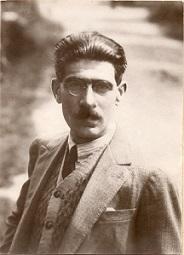
Giorgio Levi Della Vida was an Italian Jewish linguist whose expertise lay in Hebrew, Arabic, and other Semitic languages, as well as on the history and culture of the Near East.
Paul Mulla (1882–1959) was a Turkish Cretan Catholic prelate naturalized French and a professor of Islamic Studies at the Pontificio Istituto Orientale.
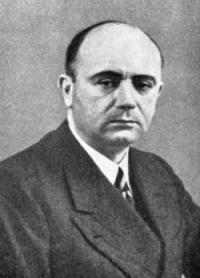
Enrico Cerulli was an Italian scholar of Somali and Ethiopian studies, a governor and a diplomat.
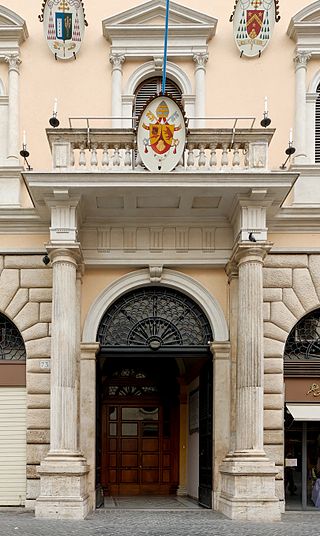
The Roman Colleges, also referred to as the Pontifical Colleges in Rome, are institutions established and maintained in Rome for the education of future ecclesiastics of the Catholic Church. Traditionally many were for students of a particular nationality. The colleges are halls of residence in which the students follow the usual seminary exercises of piety, study in private, and review the subjects treated in class. In some colleges there are special courses of instruction but the regular courses in philosophy and theology are given in a few large central institutions, such as Pontifical Urbaniana University, the Pontifical Gregorian University, the Pontifical Lateran University, and the Pontifical University of Saint Thomas Aquinas, Angelicum.
A pontifical university is a Catholic university established by and directly under the authority of the Holy See. It is licensed to grant academic degrees in sacred faculties, the most important of which are theology, canon law, and philosophy. Pontifical universities follow a European system of degrees in the sacred faculties, granting the baccalaureate, the licentiate, and the doctorate.
The Anselmianum, also known as the Pontifical Athenaeum of Saint Anselm is a pontifical university in Rome associated with the Benedictines. It offers courses in philosophy, theology, liturgy, monastic studies, languages, sacramental theology, and the history of theology.

The Pontifical Institute of Sacred Music is an institution of higher education of the Roman Catholic Church specifically dedicated to the study of church music. It is based in Rome, Italy, located in the former Pontifical Abbey of St Jerome-in-the-City.
The Claretianum, officially the Claretian Pontifical Institute of the Theology of the Consecrated Life, is an educational institute of the Roman Catholic Church in Rome founded by the Claretians. It is part of the Pontifical Lateran University as an institute specialising in the theology of the consecrated life.

Ratisbonne Monastery is a monastery in the Rehavia neighborhood of Jerusalem, Israel, established by Marie-Alphonse Ratisbonne, a French convert from Judaism. Work on the building, designed by the French architect M. Daumat, began in 1874 on a barren hill, now in the center of West Jerusalem.
Marius Canard FBA was a French Orientalist and historian.
Sister Carmen Sammut is the former leader of the International Union of Superiors General (UISG) and the superior general of the Missionary Sisters of Our Lady of Africa, known as the White Sisters. She is a Roman Catholic religious sister.

Father Francis Vincent Tiso is a Catholic priest, scholar, and writer interested in inter-religious dialogue and Tibetan Buddhism. He teaches Tibetan Buddhism at the Pontifical Gregorian University in Rome. He translated several early biographies of the Tibetan yogi and poet, Milarepa and studied the rainbow body phenomenon in Tibet. He has led research expeditions in South Asia, Tibet and the Far East, and his teaching interests include Christian theology, history of religions, spirituality, ecumenism and interreligious dialogue.

The Pontifical Biblical Institute Library serves the scholars, faculty, and students of the Pontifical Biblical Institute (PBI). It is located in Piazza della Pilotta 35, Rome. The building was the former Palazzo Muti Papazzurri. The Library and the PBI have been part of the Gregorian Consortium since 1928 and have been included in the URBE network since 1991.
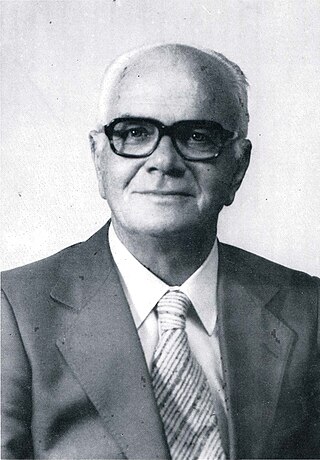
Umberto Rizzitano was an Italian academic, known for reviving Arab-Islamic studies in the University of Palermo and Sicily, neglected since the death of Michele Amari.
Dominic Eibu, is a Uganda Missionary Priest in the Catholic Church who was appointed as the Bishop of the Diocese of Kotido on 25 October 2022.












